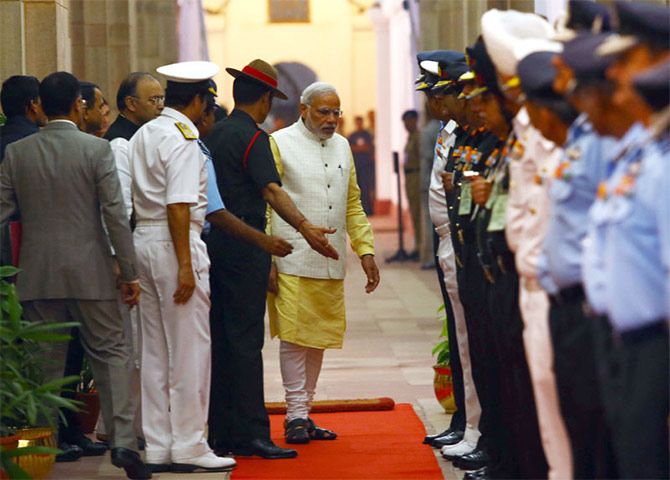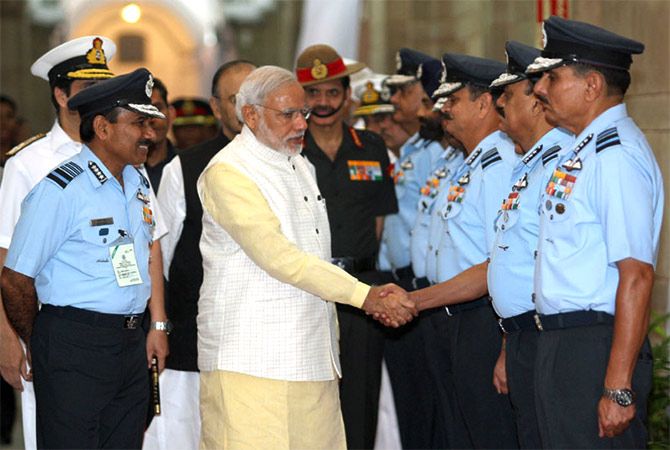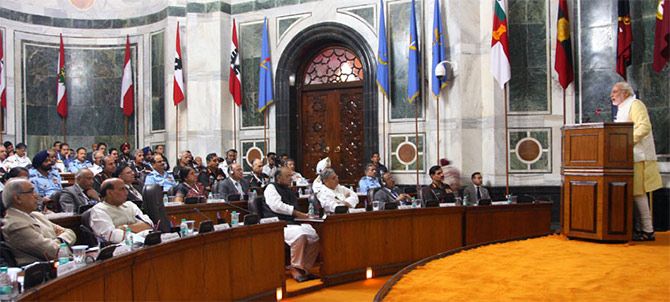'According national security and higher defence management empathetic political attention they warrant is critical. Will Prime Minister Modi pick up this gauntlet?' asks C Uday Bhaskar.
 Prime Minister Narendra Modi made his maiden address to the country's top military commanders at a closed-door conference on Friday, October 17 and the daunting context has been inadvertently provided by former naval chief Admiral Devendra Kumar Joshi.
Prime Minister Narendra Modi made his maiden address to the country's top military commanders at a closed-door conference on Friday, October 17 and the daunting context has been inadvertently provided by former naval chief Admiral Devendra Kumar Joshi.
In his first public remarks after taking the unprecedented step of resigning as Chief of the Naval Staff in February, Admiral Joshi has made the most candid and pithy summary of what ails India's national security and which should receive the prime minister's highest priority.
Admiral Joshi has noted that the Indian armed forces have been saddled with a dysfunctional and inefficient model at the highest levels of government and added that in the current system, those who wield authority have no accountability and vested interests have stalled meaningful reforms in higher defence management.
This is a stinging rebuke of what passes for higher defence management in the world's largest democracy but, alas, accurate.
The challenge for Modi is stark -- to speedily fix the most critical component of national priorities, namely that of national security. But it is also useful to recall that this challenge has been confronted by all his predecessors going back to India's first prime minister -- Jawaharlal Nehru -- with limited success.
In recent months Modi has brought a certain political assertiveness to the management of the regional strategic environment and related national security challenges, and this was evidenced in the policies pertaining to both China and Pakistan.
While China remains the more tenacious and complex, given the intractable territorial dispute and the growing power gap between the two Asian giants in Beijing's favour, the military tension with Pakistan is the more visible.
The public image is that of a confident and fearless PM who will not hesitate to use India's proven military capability against any form of adventurism and the contrast with former PM Manmohan Singh is as binary as is possible. But, as Admiral Joshi's revelation indicates, the Indian military is in different stages of 'deterioration' and in dire need of institutional redress and repair.
Hence no matter how confident the PM is, the entire system -- from the individual capacity of each armed force to the synergy with the other parts of the Indian State and the texture of the civil-military relationship -- has to deliver in an optimum manner.
Regrettably, on every front of military security, the edifice is crumbling and Admiral Joshi's resignation is only symptomatic of a very deep institutional flaw that combines varying degrees of professional ineptitude and moral turpitude.
In short, Prime Minister Modi has inherited a national security mantle that is in tatters.
Over the last decade of United Progressive Alliance governance, the less savoury part of the Indian security experience includes a purported coup by a maverick army chief; a serving chief petitioning the Supreme Court for administrative redress since the political leadership had abdicated the most venal aspersions being cast on the promotion system in the army; charges of rampant corruption in inventory procurement including bribes offered to the army chief; a naval chief resigning in frustration; senior military officers linked with misuse of office; personal vendetta distorting institutional rectitude; recruitment scams; rank insubordination and recurrent breakdown in officer-men relations; dilution of training standards...
The list is long and depressing. In short, the Indian military has lost its intangible sheen in the public perception.
 On the poor inventory and material state of the Indian military, Air Chief Arup Raha is only the most recent service chief to express concern about the shrinking platform inventory and the need for swift inductions. Again, the lost years of the A K Antony era at the helm of the defence ministry are illustrative of the accumulated backlog and the scale of the problem that confronts Modi.
On the poor inventory and material state of the Indian military, Air Chief Arup Raha is only the most recent service chief to express concern about the shrinking platform inventory and the need for swift inductions. Again, the lost years of the A K Antony era at the helm of the defence ministry are illustrative of the accumulated backlog and the scale of the problem that confronts Modi.
A thoughtful and determined assessment of the nature of the national security problem and why it has defied remedial measures is more imperative than any swift and impulsive high level political decision.
The core structural distortion goes back to Nehru's tenure, and in the current management of national security and attendant rules of business of governance the three service chiefs are 'invisible' and remain marginalised.
The onus for national security lies with the defence secretary and the status of the armed forces HQ is that of attached offices to the ministry.
The onus for such rank distortion lies on both the civilian political leadership and the military apex over the decades for having let matters fester and allowing the sinews of the system to atrophy in this manner.
Modi may benefit from seeking a detailed review of what his predecessor Dr Singh had identified as key challenges over the last decade in the prime minister's annual meetings with the top military brass -- and why there has been so little progress.
Here the role of the permanent bureaucracy and the 'Yes Minister' syndrome that afflicts most democracies must receive appropriate scrutiny. Modi could ponder over the experience of yet another predecessor -- P V Narasimha Rao -- and the manner in which he dealt with India's most severe economic and fiscal challenge in the early 1990s. The inscrutable Rao realised that deep structural reforms were required to save the Indian economy and went about it methodically.
The highly regarded professional Manmohan Singh was hand-picked by Rao as finance minister and given the space and freedom to evolve appropriate policy changes and dismantle the oppressive 'licence raj' framework. The rest is history and India progressively revived and is now a major global economy.
 India now desperately needs a radical national security reform and the challenge is: Can NaMo do a NaRa? The challenge is compounded by the fact that today India does not have a gene pool of competent national security professionals as it did in the economic-financial sectors in the mid-1990s.
India now desperately needs a radical national security reform and the challenge is: Can NaMo do a NaRa? The challenge is compounded by the fact that today India does not have a gene pool of competent national security professionals as it did in the economic-financial sectors in the mid-1990s.
According national security and higher defence management the centrality and empathetic political attention they warrant is the critical requirement. Will Prime Minister Modi pick up this gauntlet?
Images: Prime Minister Narendra Modi at the Combined Commanders Conference on Friday, October 17, 2014. Photographs: Prime Minister's Office.
Commodore C Uday Bhaskar (retd) is Director, Society for Policy Studies, New Delhi.











 © 2025
© 2025